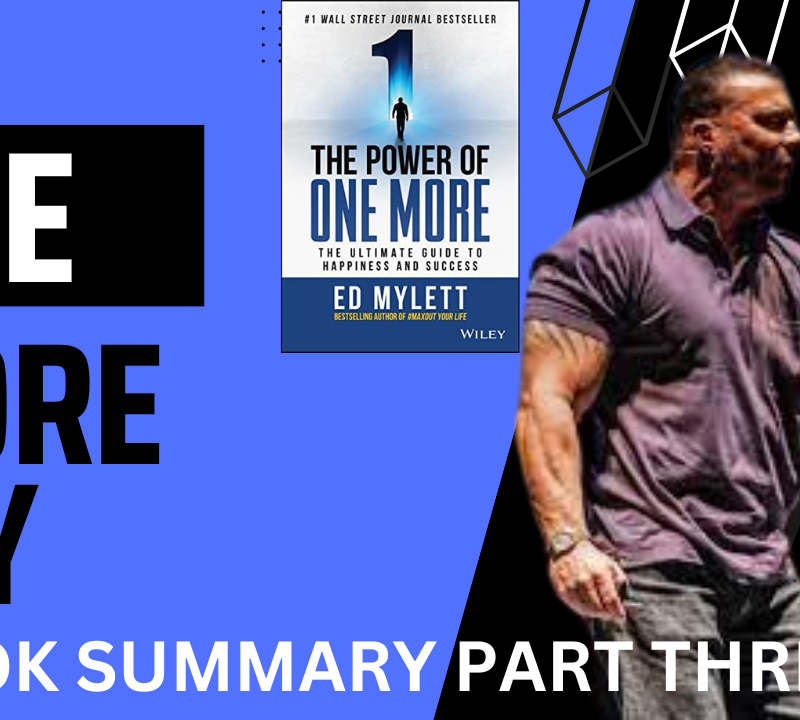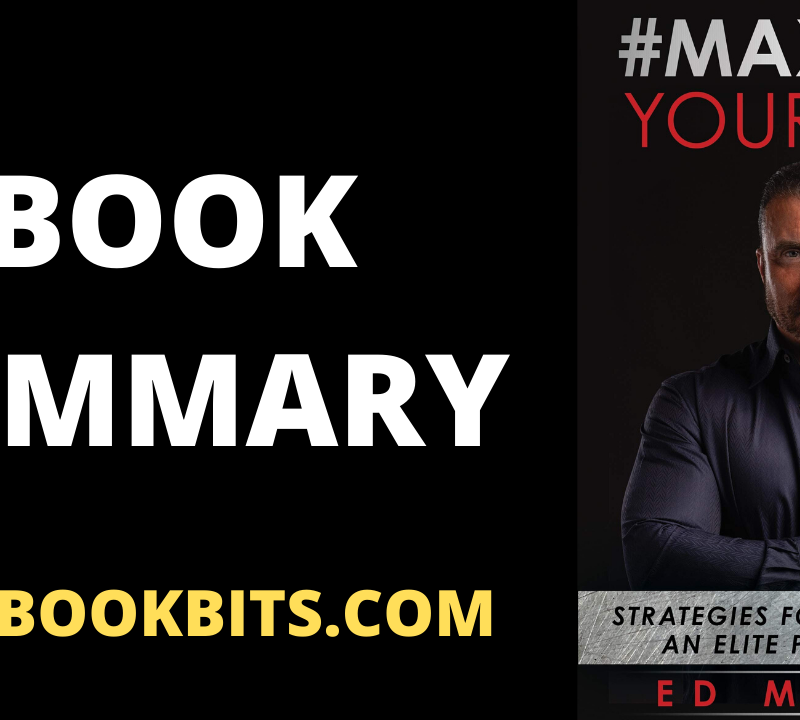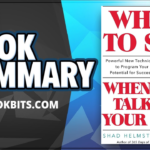★DOWNLOAD THIS FREE PDF SUMMARY HERE https://go.bestbookbits.com/freepdf
? MY FREE BOOK TO LIVING YOUR DREAM LIFE” https://go.bestbookbits.com/first-seven-steps
? SPONSOR BESTBOOKBITS BY USING PATREON https://www.patreon.com/bestbookbits
? SUPPORT BESTBOOKBITS BY CLICKING THE LINKS BELOW
150 PDF Summaries: https://go.bestbookbits.com/150
Coaching Program: https://go.bestbookbits.com/coaching
Subscribe to My Channel: https://www.youtube.com/bestbookbits?sub_confirmation=1
Website: https://bestbookbits.com
Instagram: https://www.instagram.com/bestbookbits
Spotify: https://open.spotify.com/show/0q8OW3dNrLISzyRSEovTBy
Facebook: https://www.facebook.com/michaelbestbookbits
Book Club: https://bestbookbits.com/bookclub/
Mailing List: https://mailchi.mp/d1dfc1907cdb/bestbookbits
10 HABITS
Leo Babauta has outlined 10 key habits that are crucial to have a simpler, more organised life. When you’ve implemented some of these habits you’ll find yourself with a sense of control and find that you actually get more done. However, Babauta stresses that you don’t need to do all 10 habits, some of these will be more applicable than others so decide which ones work for you.
We’ll briefly outline the 10 habits here, we’ll go into more detail later:
- Collect Habit: any ideas/tasks/jobs that come to you need to be written down on paper, carry around a notebook always.
- Process Habit: all about decision making when it comes to processing your inbox. Don’t delay.
- Plan Habit: write down the top 3 tasks you need to complete each day. Get them done first thing.
- Do Habit: complete the tasks from your list one by one. Never try to do more than one at a time.
- Simple Trusted System Habit: lists that you check regularly are crucial. Keep your list simple, straightforward and easily accessible.
- Organize Habit: eliminating the risk of clutter by tidying up as you go. Related to your desk, inbox, office and home.
- Review Habit: setting weekly goals and completing regular reviews.
- Simplify Habit: only focussing on the essentials, remove everything else.
- Routine Habit: establishing a consistent morning and evening routine that you enjoy.
- Find Your Passion Habit: dedicate your life to things you have a passion for, don’t waste your time on things you don’t care about.
Top 4
For a lot of us, the prospect of taking on 10 new habits is daunting. In this case, Babauta suggests taking on his top 4:
- Collect
- Process
- Plan
- Do
HOW TO FORM 10 HABITS
Now that we’ve identified the 10 habits, the next step in ZTD is actually adopting these habits into your life. Babauta stresses the importance of adopting these one at a time. Attempting to take on too many will only leave you stressed and unable to fully commit to any of them.
”One of the main problems people have with other productivity systems, probably without knowing it, is that they are a series of habit changes that people attempt to undertake all at once.”
When you decide to commit to a new system, it’s exciting and tempting to tackle all of the habits at once. But remember Babauta’s advice. However, the exception is that if you are already practicing these habits and have some experience in them, or if you’re someone who adapts to changes well, then you can consider taking on 2 or 3 at a time. But only do so if you are certain that your chances of success aren’t going to be affected.
”Start simple, and gradually add the other habits as you see fit.”
How to change habits
Babauta has some advice when it comes to successfully implementing the changes:
- Make a commitment, to yourself or publicly. Ensure that you are held accountable.
- The only way to ensure a habit will stick is to do it every single day for 30 days. Practice!
- Find whatever it is that motivates you and use this.
- Track the progress you make every day, either cross off days on a calendar or use a habit tracking app.
- Find support, whether it be someone else who’s taking on the same challenge as you or an online community that is full of encouragement.
- Find ways to reward yourself.
- Have a positive outlook, view the new habit and your ability in a positive light.
”Positive thinking. If you tell yourself that you can do this, that you will do it, then you will.”
COLLECT HABIT
Now we’ll dive into a more detailed explanation of each of the 10 habits.
Even though we live in a digital age, Babauta recommends using the old-school version of a pen and paper when it comes to the collect habit. Of course, you can use a smartphone if you prefer but there’s something about the physical act of writing that helps.
The key with this capture habit is to write things down right away, before you forget, and to empty out your notebook as soon as you get home or to work.”
The key is to do both actions immediately, don’t put off writing down your ideas or going over it when you return home. You’re more likely to forget if you do. And don’t go anywhere without your notebook, you never know when an idea will materialise.
Babauta explains that just by writing down information and tasks you will find a direct correlation to your organisation and productivity improvement. Now you have a system, you’ll no longer forget your thoughts and you’ll always know where to refer back to.
PROCESS HABIT
The process habit is so important, it’s all about processing to empty. This means taking your inbox, processing each email until you reach an empty inbox. Babauta recommends doing this at least once a day, more if required.
”Letting stuff pile up is procrastinating on making decisions. If you process your inboxes, making quick decisions and putting things where they belong, things don’t pile up.”
Babauta suggests that you keep the number of inboxes you have to a minimum, if you need to separate work and personal that’s fine, but try not to have more than two. The key is to be able to have a handle on all inboxes and never let them overflow. Babauta explains that the best process is to view emails from the top down, without skipping any. When you open each email, deal with it immediately in one of the following 6 ways:
- Delegate
- Delete
- Reply immediately or take action
- Defer it for later
- File it (only if you’ll need to check back as a reference later)
- Whatever you do, don’t leave it in your inbox.
PLAN HABIT
Planning is essential if you want to get on top of all your tasks and have your workdays running smoothly. At the beginning of your week, you should identify the biggest tasks for the week (big rocks). These are what need to be dealt with first. Babauta recommends that each day, you write down 1-3 tasks that are the most important that day. If you do these first thing in the day, you guarantee they get done and your big tasks slowly get ticked off. By getting them done it first it means that no other un-important tasks can get in the way and distract you from the tasks.
Babauta suggests setting aside some time at the beginning of each new week to establish what your to-do list is. He refers to ‘Big Rocks’ a term coined in Stephen Covey’s 7 Habits of Highly Effective People that refers to the main things you want to accomplish that week. If you schedule these first, the other little tasks (small rocks and gravel) will filter in around your big rocks and your schedule will be complete. Babauta reminds us to never have more than 4-6 Big Rocks in a week to avoid overwhelm.
DO HABIT
As mentioned earlier, Babauta stresses the importance of only focusing on one task at a time. As humans, we really don’t have the ability to perform a task well if we are multi-tasking. Quality is always going to be compromised. Here’s how Babauta recommends you plan out your ‘doing’
- Select which ‘Big Rock’ you’re going to work on. Identify one step or task within that and work on it until completion (or for a pre-determined amount of time).
- Set up a ‘work zone’ by eliminating distractions such as cell phones and email notifications.
- Setting a timer can be a good way to focus for a set amount of time.
- If interruptions occur, don’t deal with them as they come in. Simply write down the distraction on your notepad and you can deal with it when you’re done.
- Don’t check your email during your focused time.
- Occasionally, something urgent will come up. And this is unavoidable. In this situation, take note of where you are at in your current task, deal with the urgent situation and return to your task as soon as possible.
- Don’t forget to take little breaks, relax for a few moments, get some fresh air, stand up and stretch.
”Focus on doing your tasks one at a time, to the exclusion of all else.”
SIMPLE TRUSTED SYSTEM HABIT
There’s an overwhelming amount of different productivity systems, apps, and programs. Babauta believes that we get too caught up in trying them out, seeing what else is out there and learning new tools that our work comes second. In the ZTD system, Babauta recommends selecting one system, and using the simplest tools possible, and sticking to it.
”ZTD is about the doing, not the tools.”
Here are Babauta’s recommendations — the simplest, most effective tools:
- Simple GTD: it doesn’t have a lot of features, but that’s its appeal.
• Moleskine or any small notebook for notes on the go.
• Tadalist: a basic list program.
• Todoist: another basic list manager.
• Calendar: Google Calendar, Outlook or a paper calendar.
• Reference system: alphabetical or numerical always. And for physical filing consider manila folders, and for digital files, use your basic computer documents system.
ORGANIZE HABIT
”Your life can be completely organized with one single rule: put everything in its home.”
Babauta explains that you need to establish a clear system. Have a physical inbox where papers, bills etc. can go. And ensure that you go through this and empty it regularly (just like your email inbox).
Everything should have a home, nothing truly belongs on the bench or next to the door. Consider where your belongings should be and put them there whenever you are done with them. Babauta explains that having a home for things like your car keys is extremely beneficial, you’ll always know where they are. Keep all flat surfaces clear, just because they are flat does not mean they are a place to put things!
Establish your filing system, and Babauta stresses that you should never have a ‘Misc.’ or ‘Other’ file. All you are really doing with these is procrastinating. And put labels on things so you know what they are and where they belong. Invest in a label maker if you like!
Put things away as soon as you are done with them. Never put anything aside to deal with later. This will eventually become automatic. A few minutes now is a lot easier than hours later when you have countless things to put away.
”Evaluate. Every now and then, it’s good to review your organization of everything.”
REVIEW HABIT
Babauta highly recommends carrying out a review at the end of each week. There are 5 steps to keep in mind when you carry out your review to keep it simple and straightforward:
- Consider and review both your one key long-term and one key short-term goals. Doing this for the first time will lay the foundations and every week following you can simply re-visit the goals and review whatever progress you have made.
- Collect and go over all of your notes. Even the ones that are already completed. By doing this you’ll be able to identify any missed steps or notes you need to carry on to next week.
- Take a look at your calendar, what you’ve done in the past week and what’s coming up. Ensure nothing gets missed.
- Take a look at your lists, cross off anything that’s been completed. Familiarise yourself with your follow-up list so you know what needs to be done next week.
- Identify your short-term goal for the following week and make plans towards your long-term goals.
”Remember: just focus on one goal at a time, making it much more likely that you’ll achieve it. Print it out and post it up if necessary. Send yourself email reminders. Tell everyone about it. However you do it, maintain that laser focus, and it will happen.”
SIMPLIFY HABIT
Babauta’s simplify habit can be applied to all areas of your life, but most importantly your lists. If you can prioritise and get your list down to just the simple essentials then you’ll be better focused and know what to do next.
Babauta explains that often tasks become unnecessary, circumstances occur and maybe you simply don’t need to do it anymore, or if someone else can do it, pass it on to them. Eliminate anything that isn’t necessary and isn’t working towards your goal. In order to do this successfully, it’s important to understand what your main goal. Little tasks will likely be necessary in reaching these goals and these can stay, but eliminate anything that isn’t going to help you progress.
An important lesson from Babauta, and one we all struggle with is our commitments. Too easily we agree to every opportunity regardless of whether we truly want to do them or not. By simply saying no to more and placing more value on your time you will find a sense of freedom. Only commit to things that make you happy and have the ability to add value to your life.
Babauta explains that our current lives are full of incoming information and this can lead to overwhelm. Eliminate the amount of websites you view, commit to only reading one news site not 6 or 7. Cut back on RSS feeds and consider how many emails you receive and how many truly require a response.
“Biggest value. Focus on tasks that will make a name for you, generate long-term income, give you satisfaction and happiness. Eliminate the rest.”
Another way that Babauta recommends we simplify our lives is by batching tasks. All of the little tasks that come up during that day can be written down and dealt with later.
ROUTINES HABIT
Routines are an essential part of the Zen to Done lifestyle. Following a simple routine will help you take control over your life and set you up for success.
Babauta recommends having a morning routine, and actually establishing two slightly separate ones. One for when you wake up at home and a second when you arrive at work. It’s also a good idea to establish an end of day routine. ‘
Regarding your personal life, Babauta recommends you ritualise things activities such as yoga, ever wise and recreational reading. If you want these to be part of your morning, then set aside some time. For personal errands such as groceries, banking, post, batch these tasks and set a routine to do them all together once a week. Things such as laundry and cleaning should be spaced out in your week, don’t have an entire day dedicated to all of these household chores or you’re less likely to do them. For example, commit to Monday morning and Thursday mornings for laundry. Use Saturday afternoon to vacuum and dust etc.
As far as work goes, Babauta recommends you establish a list of everything you plan to do. Write down everything from the weekly review to setting MIT’s and processing your email. Then establish when each thing will be done. For example, set aside the last hour of work every Friday to complete your review.
Babuata explains that the planning of your routine is the easy part. Now you have to actually do them. He explains that you need to stick to your new routine for a week at minimum. After the first week, sit down and review how everything went. If there were times where you were overwhelmed and had too much to do or times where you weren’t feeling productive then make amendments and adjustments. It’s going to take 30 days for your new routine to become habitual.
“Take control of your life. Set some routines and learn to follow them.”
FIND YOUR PASSION HABIT
Babauta’s final habit is sometimes the hardest to conquer but once you do it’s definitely the most rewarding.
”Give it a thought: if you really want to do something, you’ll work like hell to get it done. You’ll work extra hard, you’ll put in even more hours, and you’re less likely to procrastinate. It’s for work that you don’t really care about that you procrastinate.”
Ask yourself what it is you truly love. You might already have a hobby or something you did in the past. Is there any way you could make money from this? Do your research, is anyone else out there doing it already?
Babauta reminds us that just because your currently doing a job, that doesn’t mean it’s the only career path for you. Perhaps you’re working as an accountant but spend all of your free time reading about fitness and health. Maybe you love helping your friends train at the gym and being a personal trainer is something you’d love to try. If this is the case, look into this new option, write down your ideas, see if its possible, ask for opinions. Babuata recommends finding a way to trying it out before you dive head first into a new business venture, do thorough research and ensure it’s something you want to do.
”Never quit trying.”
CONCLUSION
Key takeaways
- There are 10 Habits that Babauta recommends you implement into your life, but don’t take them all on at once, one at a time is better. And you don’t have to do them all, identify which ones would improve your life and commit to those.
- Collect Habit: any ideas/tasks/jobs that come to you need to be written down on paper, carry around a notebook always.
- Process Habit: all about decision making when it comes to processing your inbox. Don’t delay.
- Plan Habit: write down the top 3 tasks you need to complete each day. Get them done first thing.
- Do Habit: complete the tasks from your list one by one. Never try to do more than one at a time.
- Simple Trusted System Habit: lists that you check regularly are crucial. Keep your list simple, straightforward and easily accessible.
- Organize Habit: eliminating the risk of clutter by tidying up as you go. Related to your desk, inbox, office and home.
- Review Habit: setting weekly goals and completing regular reviews.
- Simplify Habit: only focussing on the essentials, remove everything else.
- Routine Habit: establishing a consistent morning and evening routine that you enjoy.
- Find Your Passion Habit: dedicate your life to things you have a passion for, don’t waste your time on things you don’t care about.
★DOWNLOAD THIS FREE PDF SUMMARY HERE https://go.bestbookbits.com/freepdf
? MY FREE BOOK TO LIVING YOUR DREAM LIFE” https://go.bestbookbits.com/first-seven-steps
? SPONSOR BESTBOOKBITS BY USING PATREON https://www.patreon.com/bestbookbits
? SUPPORT BESTBOOKBITS BY CLICKING THE LINKS BELOW
150 PDF Summaries: https://go.bestbookbits.com/150
Coaching Program: https://go.bestbookbits.com/coaching
Subscribe to My Channel: https://www.youtube.com/bestbookbits?sub_confirmation=1
Website: https://bestbookbits.com
Instagram: https://www.instagram.com/bestbookbits
Spotify: https://open.spotify.com/show/0q8OW3dNrLISzyRSEovTBy
Facebook: https://www.facebook.com/michaelbestbookbits
Book Club: https://bestbookbits.com/bookclub/
Mailing List: https://mailchi.mp/d1dfc1907cdb/bestbookbits













